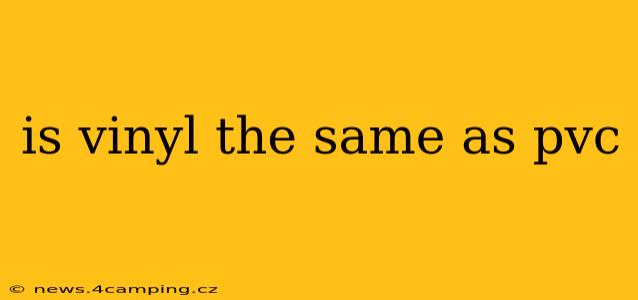Is Vinyl the Same as PVC? Understanding the Relationship Between Vinyl and PVC
The short answer is: yes, vinyl and PVC are essentially the same thing. However, the terms are often used interchangeably, leading to some confusion. Let's delve deeper into the relationship between these two materials.
Vinyl is a common name for a type of plastic polymer. It's a versatile material used in a vast range of products, from flooring and siding to records and clothing. The term "vinyl" is often used in everyday conversation and marketing.
PVC, or Polyvinyl Chloride, is the actual chemical name for the polymer that makes up vinyl. It's the precise technical designation for the material. Think of "vinyl" as the brand name and "PVC" as the scientific name for the same product.
So, while they refer to the same substance, the terms are used in different contexts:
- Vinyl: Often used in less technical settings, emphasizing the material's flexibility and widespread applications.
- PVC: Primarily used in technical specifications, manufacturing processes, and scientific literature.
What are the properties of Vinyl/PVC?
Vinyl's popularity stems from its unique properties:
- Durability: PVC is resistant to water, chemicals, and abrasion, making it long-lasting and suitable for outdoor applications.
- Versatility: It can be molded, extruded, or calendared into a wide array of shapes and forms, leading to its diverse applications.
- Affordability: PVC is a relatively inexpensive material to produce, contributing to its widespread use.
- Low maintenance: It generally requires minimal upkeep and cleaning.
What are some common uses of Vinyl/PVC?
The versatility of vinyl/PVC makes it a ubiquitous material. Some examples include:
- Flooring: Vinyl flooring is a popular choice for its durability, water resistance, and affordability.
- Siding: PVC siding is a common choice for homes due to its low maintenance and resistance to weathering.
- Pipes: PVC pipes are widely used in plumbing due to their strength and resistance to corrosion.
- Window frames: PVC frames are becoming increasingly popular for their durability and energy efficiency.
- Records: While not as common today, vinyl records remain a popular medium for audiophiles.
- Clothing: Vinyl is used in the production of various clothing items, such as raincoats and jackets.
What is the difference between rigid and flexible vinyl?
The properties of vinyl can be altered through the manufacturing process, resulting in two main types:
- Rigid PVC: Used for applications requiring strength and stiffness, such as pipes and window frames.
- Flexible PVC: Used for applications where flexibility is needed, such as flooring and clothing. Plasticizers are added during manufacturing to achieve flexibility.
Is vinyl/PVC environmentally friendly?
The environmental impact of PVC is a complex issue. While it's durable and long-lasting, reducing waste is crucial. The production process can generate harmful byproducts, and recycling infrastructure for PVC is still developing. However, advancements in PVC production and recycling are continuously being made.
Is vinyl/PVC safe for health?
Generally, PVC is considered safe for its intended applications when manufactured and used correctly. However, concerns have been raised about the potential release of certain chemicals, especially plasticizers, in some products. It's important to choose products from reputable manufacturers that adhere to safety standards.
In conclusion, while the terms "vinyl" and "PVC" are used differently, they refer to the same material—polyvinyl chloride. Understanding its properties and applications helps clarify the widespread use of this versatile polymer. Remember to always consider the environmental and health implications when choosing products made from PVC.
